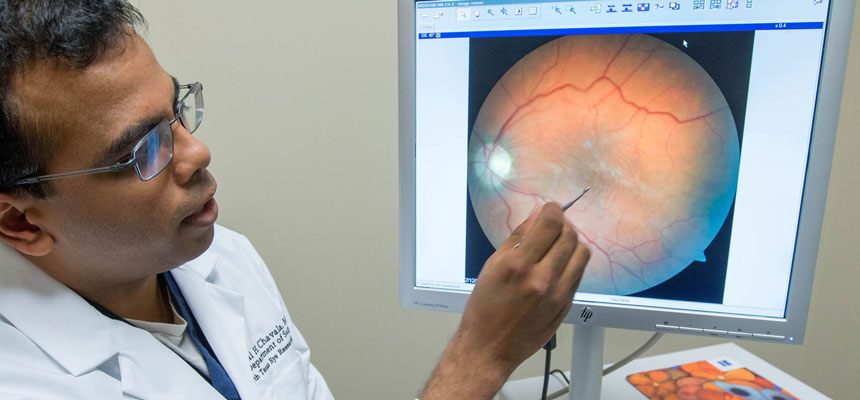Promising treatment for disease that destroys eye tissue
By Jan Jarvis
Ocular inflammation uveitis is a serious disease that can destroy eye tissue and cause irreversible blindness.
Fortunately, blindness and eye damage can be prevented by suppressing the immune system and treating the disease with corticosteroids, said Sai Chavala, MD, Professor of Pharmacology and Neuroscience and Director of Translational Research at the North Texas Eye Research Institute at UNT Health Science Center.
“While corticosteroids are effective in treating inflammation and preventing blindness, they often become intolerable over time,” he said. “There’s a risk of systemic side effects such as glucose intolerance, hypertension and osteoporosis with oral steroids.”
Treating with intraocular steroids reduces the systemic adverse effects. But this treatment can cause vision loss due to the development of a cataract or steroid-induced glaucoma.
But a class of drugs known as MDM2 inhibitors could potentially be a promising new treatment for this chronic disease, which typically strikes young and middle-aged adults. MDM2 is currently being evaluated as a cancer therapy in clinical trials.
“But we have found that the same class of drugs can inhibit ocular inflammation, which was a surprising benefit,” Dr. Chavala said.
The research team studied the effects of MDM2 in mice by using an agent that blocks MDM2. Inflammation was nearly abolished with systemic and ocular delivery of the MDM2 inhibitor.
“The results of this study are promising and suggest further research is warranted,” said Yan Fan, PhD, a post-doctoral research fellow at UNTHSC, who is first and lead author on the study.
The findings appear in the September issue of the American Journal of Pathology.
Uveitis is estimated to account for 10 percent of all cases of blindness in the United States, including 30,000 new cases of legal blindness each year. It is affects about 200,000 people in the United States. Although it usually occurs in adults, about 5 percent to 10 percent of cases start before age 16. About 43,000 new cases are diagnosed in the United States each year.
The disease is caused by inflammatory responses inside the eye, perhaps because of an attack from the body’s immune system. Infections or tumors, bruises and toxins that penetrate the eye might also lead to the disease.
Symptoms include blurred vision, eye pain and redness. Awareness of the disease has increased as celebrities such as Mila Kunis have publicly commented on the struggles uveitis patients have with vision impairment.
Co-authors for the study include Wei Zhang, Aiguo Ni and Biraj Mahato from the Department of Pharmacology and Neuroscience.
The Nancy Lee and Perry R. Bass Endowment, the Foundation Fighting Blindness and the National Eye Institutes support the study.
Disclosure statement: Dr. Chavala is founder, CEO and President of Serrata, LLC, a company that plans to commercialize MDM2 inhibitors for the treatment of ocular disease.







Social media